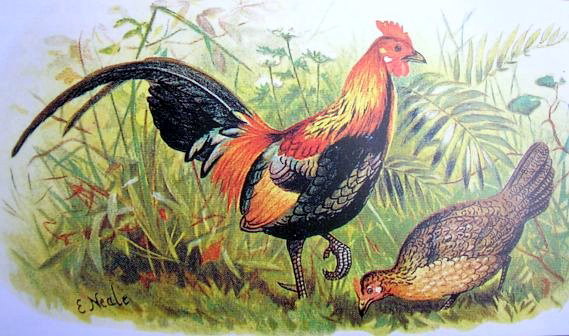|
| Query: Gallus gallus | Result: 1st of 183 | |
Red Junglefowl <!--Red Jungle Fowl-->(Gallus gallus) - Wiki
| Subject: | Red Junglefowl (Gallus gallus) - Wiki
| |

| Resolution: 569x336
File Size: 90503 Bytes
Date: 2006:09:21 11:37:22
Camera: E3700 (NIKON)
F number: f/2.8
Exposure: 10/370 sec
Focal Length: 80/10
Upload Date: 2007:09:16 19:20:24
|
Red Junglefowl
From Wikipedia, the free encyclopedia
[Photo] Red Junglefowl. Source Hume and Marshall, Game Birds of India, Burmah and Ceylon (1879-1881). Date 1881. Author A. O. Hume
The Red Junglefowl, Gallus gallus, is a tropical member of the Pheasant family and the direct ancestor of the domestic chicken. It was first raised in captivity at least 5,000 years ago in India, and the domesticated form has been taken all around the world as a very productive food source for both meat and eggs, which some breeds have been specifically developed to produce.
The range of the true species stretches from northeast India (where the pure species has almost certainly been diluted with back-crosses from domestic breeds) eastwards across southern China and down into Malaysia and Indonesia.
Each of these various regions had its own race or subspecies such as:
Gallus gallus gallus Indochina
Gallus gallus bankiva Java - Bankiva Fowl
Gallus gallus jabouillei Vietnam
Gallus gallus murghi India
Gallus gallus spadiceus Myanmar (considered by some the true ancestor of the domestic bird)
Gallus gallus domesticus (the domestic Chicken)
Male and female birds show very strong sexual dimorphism. Males are much larger; they have large red fleshy wattles on the head and long, bright gold and bronze feathers forming a "shawl" or "cape" over the back of the bird from the neck to the lower back. The tail is composed of long, arching feathers that initially look black but shimmer with blue, purple and green in good light. The female's plumage is typical of this family of birds in being cryptic and designed for camouflage as she alone looks after the eggs and chicks. She also has no fleshy wattles on the head.
During the breeding season, the male birds announce their presence with the well known "cock-a-doodle-doo" call. This serves both to attract potential mates and to make other male birds in the area aware of the risk of fighting a breeding competitor. The lower leg just behind and above the foot has a long spur for just this purpose. Their call structure is complex and they have distinctive alarm calls for aerial and ground predators to which others react appropriately.
Flight in these birds is almost purely confined to reaching their roosting areas at sunset in trees or any other high and relatively safe places free from ground predators, and for escape from immediate danger through the day.
Current research testing the genetic integrity of this species across its natural range appears to prove that the pure form is quite rare and may even be extinct, only represented in the wild by birds with various degrees of back crossing with domestic selections (breeds) of the species.
The other three members of the genus, Sri Lanka Junglefowl Gallus lafayetii, Grey Junglefowl Gallus sonneratii and the Green Junglefowl Gallus varius do not produce fertile hybrids with the Red Junglefowl Gallus gallus, suggesting that it is the sole ancestor of the domestic chicken.
http://en.wikipedia.org/wiki/Red_Junglefowl
| The text in this page is based on the copyrighted Wikipedia article shown in above URL. It is used under the GNU Free Documentation License. You may redistribute it, verbatim or modified, providing that you comply with the terms of the GFDL. |
|
Comments |
|---|
| | Guest |
|
Common Name: Chicken - Red Jungle Fowl
Other Common Names: Red Junglefowl
Scientific Name: Gallus gallus gallus
Group: Peahens and Pheasant
Origin or Range: Asia |
| | Guest |
|
Scientific Name: Gallus gallus (Linnaeus, 1758)
Common Names: Red Junglefowl, Red Jungle Fowl
French: Coq bankiva German: Bankivahuhn Spanish: Gallo bankiva
Taxonomy: Phasianus Gallus Linnaeus, 1758, Poulo Condor, south Vietnam. |
^o^
Animal Pictures Archive for smart phones
^o^
|
|
|

